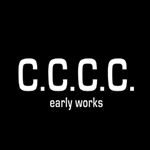|
|
 |
Dusted Reviews
Artist: c.c.c.c. Album: Early Works Label: No Fun Review date: Nov. 19, 2007 |

|
|
|
 |
Many noise fans might not be familiar with Cosmic Coincidence Control Center, but they likely know the initials c.c.c.c. The Japanese group (largely a trio during the era covered by this four-disc set) are legends of Japanese noise, but Early Works exhibits some of c.c.c.c.'s first steps, largely from their inception in 1990 until 1992. Founding member Mayuko Hino's philosophy of noisemaking centered on catharsis through sound and highly personal performance, and c.c.c.c.'s highly charged concoctions have often reflected those ideas rather clearly. Teeming with the usual tropes of Japanese noise (harsh sounds at high volume), c.c.c.c. aren't a band who conceded anything to their peers with respect to sheer aural force, but the duo/trio always sowed a distinctive sound amidst the distortion, and Early Works, with its documentation of the group's first two years, provides a chance to hear how the group's sound evolved.
"Live at Gospel #1" opens Disc One with the core c.c.c.c. duo of Hiroshi Hasegawa and Mayuko Hino punctuating the grating hum of electronics with mutilated guitar and the percussive styli of Hino's metal plate. The piece, masked to an extent by the recording's fidelity, allows for a surprising amount of space, with a clear separation of voices and respite amidst the chaos. "Live at Gospel 2," recorded only three months later, introduces percussionist Fumio Kosakai to the mix, and his contributions are immediate, the linchpin around which the noise swirls. The strident rhythm that rises up after five minutes of ambient tonality serves as a catalyst for the music's later assault, which, as the percussion dies away, is quick to follow in a slow decrescendo.
During the subsequent three discs, Early Work shows c.c.c.c. to be a band unable to sit still, and even as the performances grow more claustrophobic and imposing, there remains a diversity of sound. And as the fidelity of the recordings increases, c.c.c.c.'s crowded miasmatic storm grows all the more powerful. By the time Disc Four and "Phantasmagoria" hit, the group's in fine, heavy-hitting form. "Magick in the Cave," the sole studio product of the whole set, fast forwards things a bit to 1997, but, otherwise, Early Work traces c.c.c.c.'s development chronologically over the first two years of their existence, using live documents as its evidence.
As a retrospective of the group's early years, this set isn't quite the norm, for there exists no true period of nascent uncertainty for c.c.c.c. Despite the clumsiness or heavy-handedness present in the group's earliest work, there's nothing within Early Works as embarrassing as what usually constitutes early performances. Instead, c.c.c.c. seem to have moved through their musical adolescence rapidly, and, within a year of their genesis, coalesced as a band of considerable noisy aplomb. With the discs' contemporary recordings long out of print, Early Works is as valuable an addition to the band's catalog as the recently released Chaos is the Cosmos, c.c.c.c.'s first new recording in nearly a decade. The sound that c.c.c.c. helped to spawn now flourishes a generation later, but Early Works proves, as if proof was needed, that today’s young turks of noise have nothing on their elders.
By Adam Strohm
|







